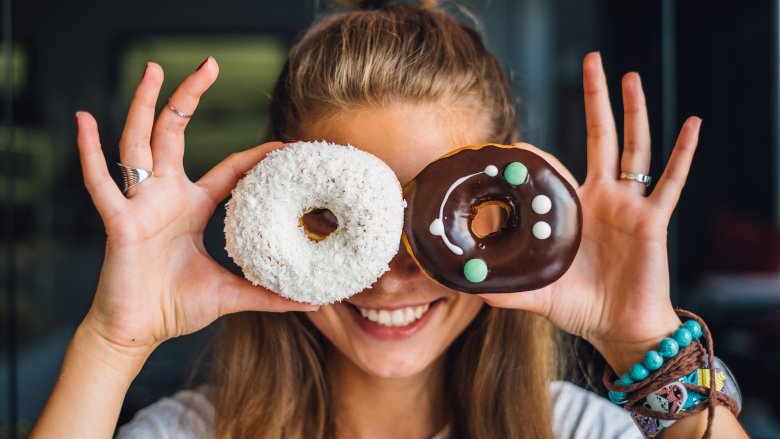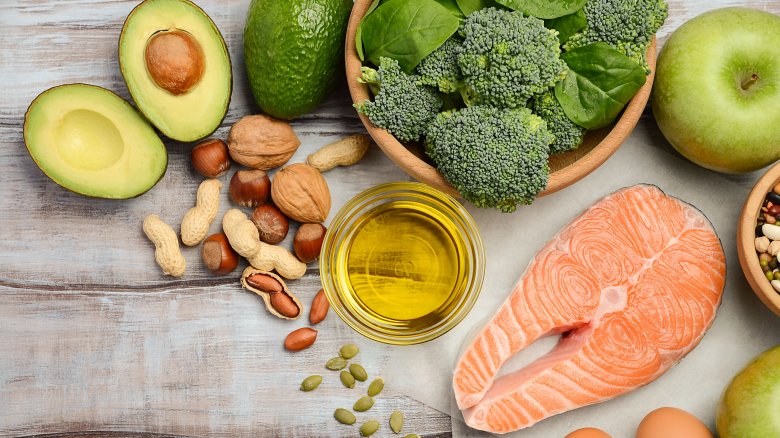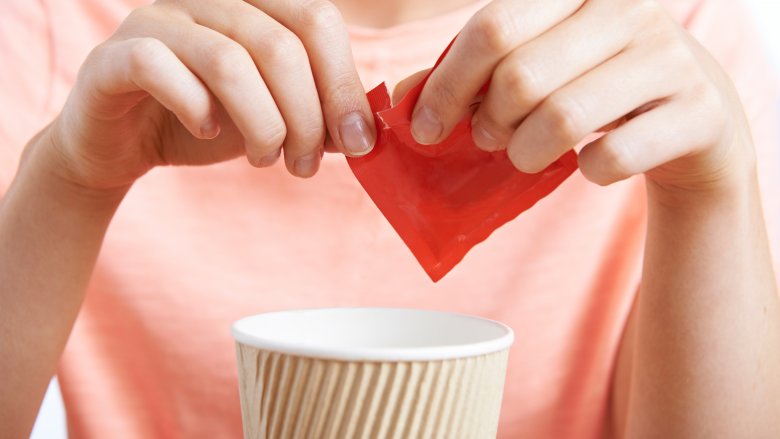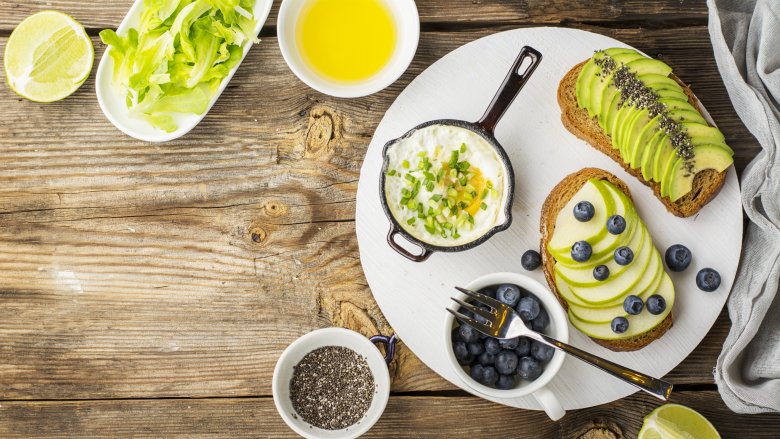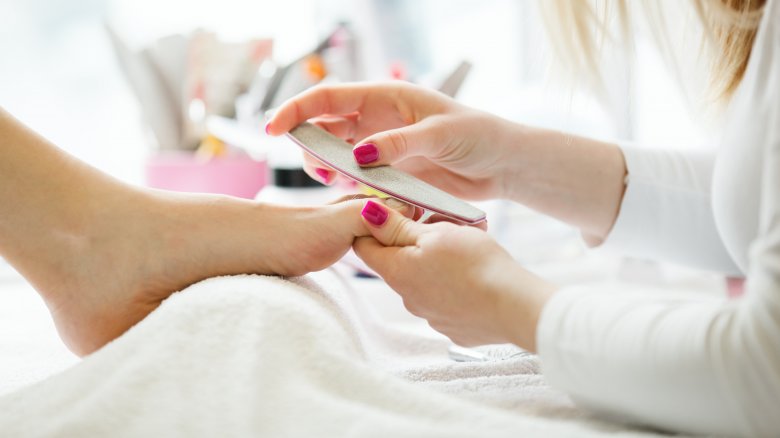Ways To Break Your Sugar Addiction
At one point or another, we have all dealt with a sugar addiction. I recently gave up all sugar for 30 days and felt actual withdrawal symptoms. I was exhausted and couldn't shake a nagging headache. I was also snapping at my family for no reason at all.
Giving up sugar cold turkey is one option for breaking the addiction, but fortunately for our relationships with friends and family, it is not the only option. I had the chance to speak with leading physicians, health coaches, and wellness providers on manageable steps to breaking your sugar addiction.
Make sure you're eating enough fat
Do you remember the fat-free trend in the '90s? Suddenly we were bombarded with fat-free cookies and crackers, and they seemed healthy. We avoided fats, because we assumed eating fat made us fat. However, food companies simply replaced the fat in their products with sugar.
Our bodies need fat to feel full and satisfied, so it is crucial to consume enough when giving up sugar. "When you're cutting back on sugar, pay attention to your fat intake," Registered Dietitian with Virta Health Catherine Metzgar told me. "Not only does fat keep you full longer and provide greater satiety than sugar and carbohydrates, fat can also help manage your hunger and cravings. Try a square of 86 percent dark chocolate with a bit of peanut butter or even some berries with some heavy cream."
Eat sweet vegetables
Another way to support your body when giving up sugar is to look for better sources of sweetness. Rather than focusing on the sugar that you're missing, look for natural sources to add into your diet.
"By adding in naturally-sweet vegetables and spices, more sleep, water, and regular fat foods, a person can crowd out their addiction to sugar," Michele J. Szymborski, a holistic health coach, told me. "Eat sweet vegetables earlier in the day to diminish evening sugar cravings."
Some examples of naturally sweet vegetable are sweet potatoes, red bell peppers, and carrots.
Manage your stress
Have you ever walked into your kitchen after a stressful day at work and gone directly to the pantry? You weren't even thinking about what you were doing, you just naturally started raiding the shelves for sugar. Moments later there were candy wrappers everywhere, and you felt a little better. That's because most of us crave sugar when we're stressed.
According to a study in the Journal of Clinical Endocrinology and Metabolism, eating sugar when you are stressed actually quiets those stress signals to the brain. That is why you literally feel better and more calm after inhaling that brownie.
To help your body fight this sugar urge, make sure you're not sabotaging yourself with sweets in the house, especially during times of high stress. "Keeping a positive environment makes it harder to make an unhealthy choice and it also helps you to delay a response to the craving," Cleveland Clinic Psychologist Julie Rish told Reuters. "Those cravings peak over 15 to 20 minutes, and if you can just delay them and distract yourself for that long the cravings start to come down on their own."
Cut down on the sugar in your coffee
Many of us are consuming a lot more sugar than we realize. How much sugar is in your favorite pasta sauce, salad dressing, or boxed crackers? Another sneaky place for sugar to hide is in our coffee. Fortunately, we can retrain our palates, so cutting back on sugar in your morning coffee is a good place to start.
"It is tough to break the habit. What I have done with my patients is to ask them to study coffee and tea and learn to enjoy the genuine taste without the sugar. Then once they accomplish this, they generally reduce other sugar products," Dr. Murray Grossan told me. "One important aid is to demonstrate how many pounds of sugar is used in a lifetime just dropping the tea and coffee! This could be a major means of avoiding diabetes. But I start with teaching them to study 'great' coffee and tea without and learn that."
Have fun with this process and become a coffee snob. The better the coffee, the less sugar your taste buds will be calling for.
Try a supplement
Sometimes our sugar cravings are trying to tell us something. For example, craving specific sweet foods could mean we're low in certain nutrients, so talk with your doctor about starting a supplement to help with those cravings.
The supplement L-glutamine may help stave off cravings. "This amino acid has been found to help reduce, and even eliminate, cravings by helping to steady blood sugar," Certified Holistic Health Counselor Jacqueline Banks wrote for Fox News. "Add 500 milligrams three times a day with meals and an extra dose when a craving hits. Taking as little as a quarter teaspoon at the onset of a sugar craving should stop it in its tracks."
Get your gut health checked
When it comes to our sugar cravings, we get to be the detectives. Once we figure out what our triggers are, we can set ourselves up for success. Some people crave sugar because they have a bacterial imbalance in their guts, so changing their overall diets could be helpful.
A bacterial imbalance could be the result of many issues, but a common one is chronic antibiotic use. Antibiotics kill bad bacteria, but they also kill our good bacteria, making it easier for yeast to start growing in our guts. "In order to live, yeast organisms feed on sugar, which somehow can throw off your balance enough that you will crave even more sugar and carbs," Functional Medicine Physician Wendie Trubow wrote in the Huffington Post. "The more sugar you ingest, the more the yeast grows and the more sugar you then crave, creating an endless cycle."
So how can you tell if you have an imbalance going on? Trubow recommended starting with an easy test at home. Next time you're hungry and grab a snack, pay close attention to your cravings. "Eat something with real nutritional value that is minimally processed and still resembles the food it started as," Trubow wrote. "If, after eating, you're still craving carbs or sugar, it's possible that there is another issue at play."
Sit in meditation
Most of us don't want to eat sugar every day. It weighs us down, makes us tired, and leaves us feeling regretful. Yet somehow we end each day having eaten too much of the sweet stuff. Slowing down and remaining more mindful of your feelings and cravings can help you avoid those sugar binges.
"A few very valuable tools I use while working with my clients are understanding that often times a sugar addiction is a symptom, and the cause very often is that you're craving for the sweetness of life," Claudia Matles, a certified health coach, told me. "Learning to embrace this yearning and understanding how to open up to the deliciousness of life's sweetness will help you rid the sugar. Meditation is a wonderful aspect on your new and healthy journey." Take some time just for yourself and breathe deeply. What do you have to lose?
Try hypnosis
If you are at the point where you feel like you've already tried it all when it comes to giving up sugar, maybe it's time to try hypnosis. "Hypnosis is a powerful tool to resist urges to ingest sugar. Seek out a certified hypnotherapist in your area to 'reprogram' you to avoid refined sugars. It should not take more than three sessions to do so," said Nancy B. Irwin, a Los Angeles-based doctor of psychology and clinical hypnotist. "Self-hypnosis recordings online can be great, but when it is specifically tailored to the individual's triggers, habits, and needs, it is much more effective."
Like meditation, hypnosis is another opportunity for you to slow down and stay aware of your sugar triggers.
Plan ahead
Giving up sugar is no easy feat. One of the most powerful strategies is simply making a plan ahead of time. Don't just walk into the grocery store empty handed. Make a list, and commit to yourself to not even walking through the sugary cereal aisle.
"The first step in breaking a sugar addiction is to not buy sugary foods and junk food while you are out food shopping. If you don't stock up sugary and junk foods at home, you will not be eating them at home," Registered Nurse and founder of Remedies for Me Rebecca Lee told me. "Start off slow when starting to break a sugar cycle. Cut out junk food one-by-one. Add in some healthy and natural sweet foods into your diet at the same time as you are cutting back on junk and sugary foods."
Another way to plan ahead is finding an accountability partner. "If you're married or living with a partner, you already have an advantage! Have them join you on your quest," recommended Lee. "You can encourage each other to make smarter choices. It's hard to break longtime habits on your own. It's good to have accountability partners that can coach you or be your own personal cheerleader."
Feel your feelings
We can't help but link our feelings to sugar. Many of our happiest memories involve sugar. Think about all those birthday treats, Christmas candy canes, and wedding cakes. It's okay that you have an emotional relationship with sugar, so long as you recognize it.
"Sugar addiction is tied to emotions. It illuminates the same part of the brain that cocaine does! It's absolutely addicting. Sugar is tied to fond memories; we use sugar to celebrate happy times in our lives," Certified Holistic Health Coach Stephanie Powers told me. In fact, a study in PLOS One showed just how powerful this addiction is. Researchers exposed animals to sugar in water and the highly-addictive drug cocaine. Then they watched to see which substance the animals would crave more. Over 94 percent of the animals went for the sugar water.
"When I'm helping clients get rid of a sugar addiction, I ask them to think about why they are craving sugar," Powers added. "What emotion are they trying to numb? What is going on in their life that they need to pacify with sugar? Being aware of why they are craving certain foods helps them to stop and think twice before they reach for a Snickers bar."
Be patient with yourself
Remember that breaking a sugar addiction takes time, so it's important to be kind to yourself throughout the process. "Dealing with any kind of addiction takes time and effort," Rebecca Lewis, registered dietitian at HelloFresh, told me. "Take it one day at a time — and if you 'fall off the horse' don't let your addiction spiral out of control, instead take a deep breath, remember this is a journey, and get back to recovery."
We all slip up in the sweetness department, so just brush yourself off and try again.
Forget artificial sweeteners
When giving up sugar, it sounds reasonable to substitute calorie-free artificial sweeteners instead. This way you can remove harmful sugar from your diet without missing out on the taste. However, those artificial sweeteners like aspartame are doing way more harm. In fact, consuming artificial sweeteners like the ones in diet sodas has actually been linked to weight gain.
"It actually changes your palate, so you need more and more to feel satisfied," registered dietitian Carole Bartolotto told CNN.
Eating artificial sweeteners changes your taste buds and brain chemistry, leaving you needing more and more sugar. "The taste buds taste sweet, but there's no calorie load that comes with it. There's a mismatch here. It seems it changes your brain chemistry in some way," Dr. Marie Savard told ABC News. "Anything you put in your mouth, your body has a strong reaction to it. It's much more than counting calories. It seems normally with sweet foods that we rev up our metabolism."
Eat a healthy breakfast
Each day that you're cutting back on sugar, it's important to set yourself up for success. Plan your meals ahead of time and make sure to focus on a healthy breakfast with plenty of protein.
"Many of my female clients who are attempting to cut out sugar don't eat enough, which can lead to cravings," Laura Schoenfeld, a holistic nutritionist, told Prevention. "Simply loading up on enough healthy whole foods at all three meals, breakfast in particular, can greatly reduce these. Eating plenty of protein at each meal, especially breakfast, is also crucial, as it helps keep blood sugar stable and is the most satiating macronutrient."
Some good sources of protein for breakfast include eggs, egg whites, vegan protein powder, and turkey bacon.
Get enough sleep
Our bodies replenish during sleep, and our hormones are reset. We need quality sleep to control our hunger signals, so getting enough sleep is extremely helpful for controlling sugar cravings.
According to a study in Obesity, there is a reason why we're able to fast all night and not wake up starving. When we get a full night's sleep, our hunger signals go down. That is why you're able to fast for eight to ten hours every night without feeling it. However, when we don't sleep well, cravings go up. The authors noted that shift workers, those who work odd hours at night, are more susceptible to sugar cravings.
Make sure you're allowing for eight hours of sleep each night, because chronic late nights are going to make cutting back on sugar much more difficult.
Reward yourself in other ways
Have you ever devoured a huge piece of chocolate cake because you "deserved it?" Oftentimes we use sugar as a reward after a difficult or stressful experience. Start looking for other ways to reward yourself and help cut down on those cravings.
"Get curious about what helps you and feels like a reward. It has to be a significant enough reward to make you feel like giving up sugary treats isn't such a big deal," Susan Biali, a doctor and wellness expert, wrote in Psychology Today. "Some rewards that work for me are: a hot bath; a delicious dinner made from healthy foods that I love and look forward to; going out to meet a friend after a long day; booking a massage at a spa (I recently did that after not having done it for much too long), or buying myself a really great book to enjoy reading."
